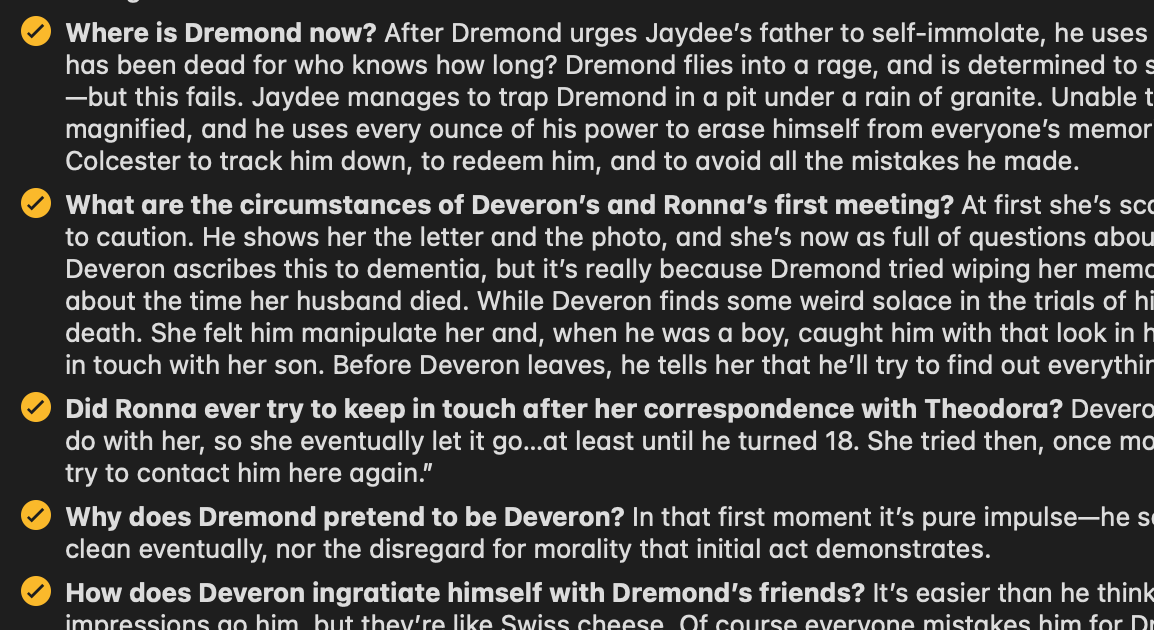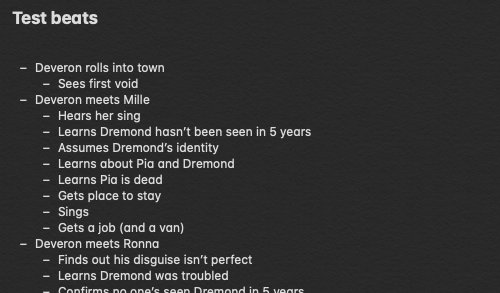I’m so glad you asked, nerds!
Back when I played music I was never a virtuoso on the keys. Rather, I lived in the sequencer—that piece of software that lets you methodically hand-tweak each note and effect and event. I wasn’t a stage musician, in other words, but a studio musician. Of course, despite this deliberate, procedural approach to the work, the goal was always to create music that flowed with a virtuoso’s grace. That was the measure of success; if any of the process showed through, you weren’t done yet.
My approach to writing is the same. If there’s a spectrum that goes from “panster” to “plotter”—that is, a writer who attacks the blank page using nothing but their wits vs. one who draws up blueprints and gets the permits settled a year before they break ground, then I’m definitely in the latter camp.
Actually, I don’t think the distinction is as clean as that, as I wrote about in my very first blog post here: “Plotting is pantsing.” I pants my outline as they say. But now I want to expand on the topic a little bit since I didn’t really get into the details of my writing process before.
Possible spoilers ahead for Songs From the Void.
When I set out to write the outlines for my first few novels, I constantly found myself faced with questions about things outside the bounds of the actual story. Who started this cult? Was it common to adopt twins into different families? What is a “polity”? In other words: What happened before the story? How did we get here?
So I decided to formalize this Q&A process, to make it another step—a pre-outline step—in my preparation. These questions cover anything that occurs to me as I think about how to approach the story, and are as granular as I need to feel confident that no gaps remain in my understanding of it. Here’s a section from the Q&A document I made for Songs From the Void (spoilers):

Somewhere around this time I’ll usually have a good feel for the timeline of the story—strictly what things happen when—which feeds into the “beat sheet.” That’s when I’ll formalize the story structure into a more satisfying progression of arcs and events that incorporate such things as setups, twists, and payoffs. This beat sheet could be as informal as a list:

Or it could live in an actual spreadsheet, if I feel the need for a more “visual” sense of the story’s shape:

Only after I have those things squared away (as well as the research document, and the cast and settings sheets, etc.) do I get started on the outline proper.
Yay, more structure!
Don’t fret, we’re nearly there now. The outline is much easier to write now, because I have all the information that feeds into it. And here is where I stake guideposts along the chronological trail, placing them as frequently as I need to “see” the entire story—right to the conclusion—before I’ve written word one. Here’s a snippet of the Songs From the Void outline:

As you can see, it’s still a sketch, but I’m not afraid to dig down into actual dialog there’s some key turn of phrase I’m keen on. Sometimes I only need to know the gist of a confrontation, for example, and other times I need to know exactly how a conversation unspools.
Whatever the level of detail, my goal is to do the story structure work, as much as possible, before I get to the principal writing. Because once I have all that (mostly) out of the way—with the reassurance that I won’t drift off course unless it serves the script—I can keep my focus 100% on the words and the poetry of the storytelling.
And that’s that! Pretty much. Not only do these steps evolve over time (and I’m sure they’ll continue to) but they adapt to the story I’m telling. Some stories are more research-heavy. Some require the structure to be more spelled out. It’s all driven by what the story “needs.”
I got to thinking about all this because I’m now going through these steps and stages all over again for my sixth book. And in some ways the process itself—at least for me—is as interesting as the writing.
But maybe I’m just a nerd that way.